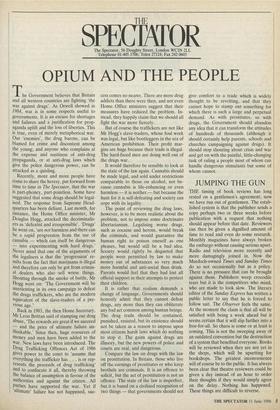SPECTAT THE OR The Spectator, 56 Doughty Street, London WC1N 2LL
Telephone 01-405 1706; Telex 27124; Fax 242 0603
OPIUM AND THE PEOPLE
Recently, more and more people have come to share the heresy, put forward from time to time in The Spectator, that the war is part-phoney, part-pointless. Some have suggested that some drugs should be legal- ised. The response from Supreme Head- quarters has been defiant. Last month, for instance, the Home Office minister, Mr Douglas Hogg, attacked the decriminalis- ers as 'defeatist and irresponsible'. 'Drugs' he went on, 'are not harmless and there can be a rapid progression from the use of cannibis — which can itself be dangerous — into experimenting with hard drugs.' Never mind that one of the arguments of the legalisers is that the 'progression' re- sults from the fact that marijuana is illegal and therefore can only be got from crimin- al dealers who also 'sell worse things. Shouting through the smoke of battle, Mr Hogg went on: 'The Government will be Unrelenting in its own campaign to defeat the drugs traffickers, who are the modern equivalent of the slave-traders of a pre- vious age.' • Back in 1983, the then Home Secretary, Mr Leon Brittan said of stamping out drug abuse, 'The rewards are great if we succeed — and the price of ultimate failure un- thinkable.' Since then, huge resources of money and men have been added to the War. New laws have been introduced. The Drug Trafficking Offences Act of 1986 gives power to the court to 'assume that everything the trafficker has . . . is or rep- resents the proceeds of drug trafficking' and to confiscate it all, thereby throwing the balance of assumption in favour of the authorities and against the citizen. All Parties have. supported the war. Yet if 'ultimate' failure has not happened, suc- cess comes no nearer. There are more drug addicts than there were then, and not even Home Office ministers suggest that their measures have reduced the problem. In- stead, they happily claim that we should all fight the war more fiercely.
But of course the traffickers are not like Mr Hogg's slave-traders, whose foul work was legal, but like bootleggers in the era of American prohibition. Their profit mar- gins are huge because their trade is illegal. The hard-faced men are doing well out of the drugs war.
It would therefore be sensible to look at the state of the law again. Cannabis Should be made legal, and sold under restrictions comparable to those on alcohol, not be- cause cannabis is life-enhancing or even harmless — it is neither — but because the hunt for it is self-defeating and society can cope with its legality.
The point of reviewing the drug laws, however, is to be more realistic about the problem, not to impose some doctrinaire libertarianism. Legalising worse drugs, such as cocaine and heroin, would break the criminals, and would guarantee the human right to poison oneself as one pleases, but would still be a bad idea. Society would rightly be disgusted that people were permitted by law to make money out of substances so very much more harmful and anti-social than drink. Parents would feel that they had lost all official support in their attempts to protect their children.
It is rather that realism demands a change of language. Governments should honestly admit that they cannot defeat drugs, any more than they can obliterate any had act common among human beings. The drug trade should be contained, punished, resisted, but its existence should not be taken as a reason to impose upon most citizens harsh laws which do nothing to stop it. The gains against drugs are illusory, but the new powers of police and courts are real, and dangerous.
Compare the law on drugs with the law on prostitution. In Britain, those who live off the earnings of prostitutes or who keep brothels are criminals. It is an offence to solicit, but the act of prostitution is not an offence. The state of the law is imperfect, but it is based on a civilised recognition of two things — that governments should not give comfort to a trade which is widely thought to be revolting, and that they cannot hope to stamp out something for which there is such a large and perpetual demand. As with prostitutes, so with drugs, the Government should abandon any idea that it can transform the attitudes of hundreds of thousands (although it should certainly help parents, schools and churches campaigning against drugs). It should stop shouting about crisis and war and get on with the painful, little-changing task of ruling a people most of whom can handle dangerous stimulants but some of whom cannot.


































































 Previous page
Previous page